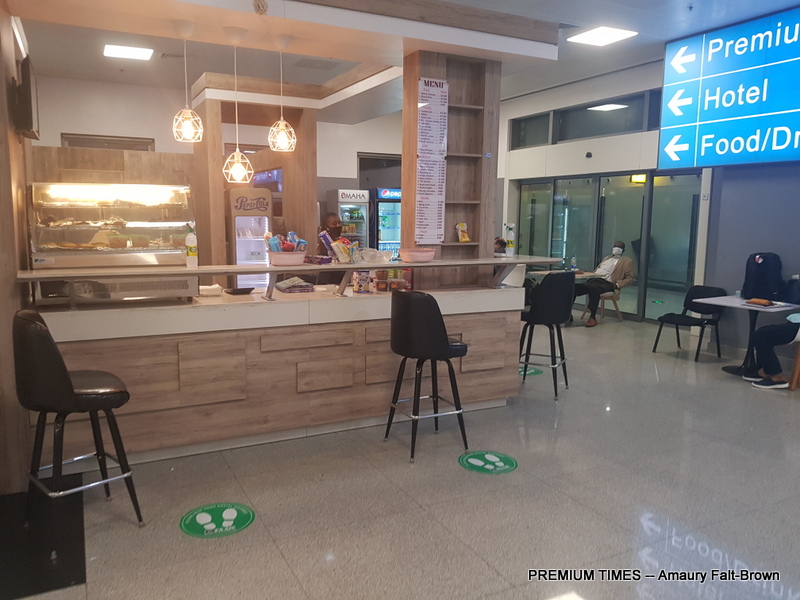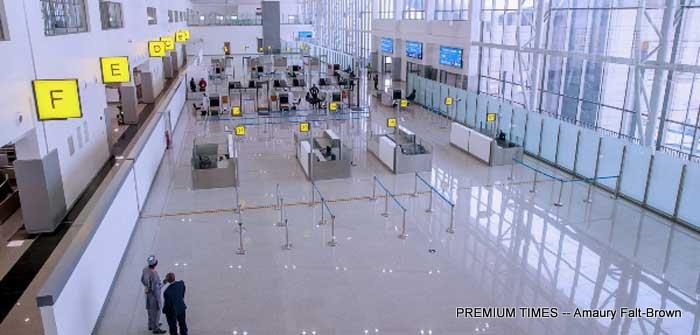It was a sunny day in December of 2018 when President Muhammadu Buhari proudly unveiled the new international departures terminal at the Nnamdi Azikiwe International Airport to great fanfare, confidently announcing that it would lead the way in making “Nigerian airports amongst the best in the world”.
Two years later, as I was flying out of Abuja, my experience at the terminal left me wondering if I was at the same airport the president had unveiled.
Pulling up to the building in a silver Toyota Camry, I had asked my taxi driver, Emmanuel, if he was sure we were in the right place: “It’s very dark here, and the area is still under construction,” I said. Emmanuel chuckled: “this is Nigeria.”
He had spent the last 30 minutes railing about the incessant corruption and mismanagement plaguing Nigeria, and, as if a case in point, could only laugh humorlessly at the metaphor that the unfinished airport provided.
Departure terminals are usually bright with lights, busy with staff milling around and spacious enough to accommodate the heavy traffic they attract. Even through the dimly lit night, I could tell that it was not the case for the country’s second busiest airport. Rather, it felt as though we had arrived at a back entrance, perhaps reserved for staff.
Adding to the confusion was the feeling of walking amid an unfinished construction site, which had long since been abandoned. I had been met by that same feeling on the flight into Abuja, a couple of months earlier.
That day, on a warm October afternoon, I hurriedly exited the airport with the giddy excitement that always greets me when arriving in a new country. Emerging from the sliding doors, however, that excitement quickly turned to confusion as it seemed I may have taken the wrong exit.
Concrete pylons lay lonely in the ground, wearing the cold metallic crowns of protruding construction irons which seemed only to be waiting for someone to come along and complete the structure they were built to hold.
The “Giant of Africa,” I thought, could not possibly reserve such a greeting for the numerous businessmen and women, diplomats and tourists visiting its proudly purpose-built capital. That day, too, another taxi driver, Bernard, had laughed at my confusion: “this is our new airport,” he said, dismayed.
Although Bernard has never left Nigeria, he seemed painfully aware that the building was not all that it was chalked up to be – at least what he could see from the outside.
Fast forward back to this December, I wondered if I would be pleasantly surprised by what I found inside. After all, a quick online search about the new terminal leads to countless articles, blog posts and vlogs that all heap praises on the “world class airport.”
Having thanked Emmanuel, I began to navigate the darkness towards a health official who was seated glumly at his post disinfecting luggage for traces of Covid-19. Beyond him lay a long, somber passageway towards a first security check, and I was in.

Christmas trees, lit up with shimmering LED lights, gave life to the hall, and accompanied the few lonely decorations that adorn the space.
The check-in area was also rather nice – simple, and devoid of the shops and cafes that usually welcome travellers, but at least it was clean and brightly lit, with high ceilings and wide glass windows. Unfortunately, that would be the end of the pleasant surprises.
After checking in, and much ducking past airport staff members and security forces requesting “presents” from travellers, preferably in the form of US dollars, I arrived at the immigration desk.
To my great surprise, a stern-faced immigration officer informed me that I had overstayed my visa, despite it being set to expire the following day. “No” he said, “your visa expires tomorrow, but this stamp says you had to renew it.”
He was right. A careful look at the blurry text under the stamp revealed a message: “Permitted to stay one month from date of arrival…” the last word completely illegible.

The officer duly called over his colleague, Mr Bello, to inform him of my error. With the chastising tone of a schoolteacher, Mr Bello began to lay the groundwork for the charade I have grown used to when dealing with Nigerian security forces.
“You have overstayed your welcome in Nigeria – you will have to pay a fine of $300.” Confused, once again, I explained that no one had informed me of this strange rule – paying $200 every four weeks to renew a three month visa is not an international norm – but Mr Bello was having none of it.
Clearly used to handling foreigners with this problem, however, he offered to “help” me out, for a price of course. I refused, politely. Besides, the N2,500 in my wallet would hardly have sufficed to satisfy his expectations.
After much back and forth, I was brought over to the officer in charge, U. Ahmad, according to the nametag.
Mr Ahmad was dealing with four Pakistani travellers with the same issue, when a young and smiling officer, M.A. Harouna, came and hurriedly explained that the issue had been cleared up and that the men could go through. I suppose they had offered him some Christmas “presents” to get out of the situation and put a big toothy smile on his face in the process.
It was my turn next. Once more, I explained my story to a decidedly nonchalant Mr Ahmad who once again repeated the bizarre visa rules. It all felt quite thuggish, standing surrounded by four men who apparently had nothing better to do than to wait for me to appease them with some cash.
Eventually, perhaps taking pity on me or perhaps understanding that I was not going to pay the bribe, Mr Ahmad said that it was not my fault this time and that I could go. Relief. I returned to the predeparture ritual, imagining the wads of cash each officer would go home with every evening.
After receiving the exit stamp in my passport and getting through the poorly designed security area, I was inside the departures area. Stress had awakened my appetite, but I soon discovered that sitting down for a nice meal would not be possible.
The departure halls design – a single, long corridor with boarding gates on either side – leaves little to the imagination and one can immediately tell that the hall is devoid of restaurants or bars. Instead, a lone café caters to the throngs of passengers.

I was once again bemused, wondering who could be behind the design and upkeep of this terminal, and if they had ever travelled.
The shabby café, lit up only by the warm smiles of its waitresses, offers a limited selection of precooked Nigerian dishes and snacks. Although I have grown fond of Nigerian cuisine, it would seem evident that an international airport has a menu reflective of its multicultural guests.

Along with its one café, the terminal has one shop, a duty-free. The rest of the commercial space remains undeveloped. This was surprising, considering that shopping is a mainstay of any international airport. It was even more surprising considering that opening shops would offer steady employment to dozens of people in a country plagued by unemployment.

Without anywhere to shop or eat, I hopped at the first opportunity to board my flight, but not before one final send off from a security guard demanding a present. I smiled, walked past and boarded the bus. Soon we were speeding across the tarmac towards the Boeing 737.
My final thoughts that night brought me back to September of this year, as I was leaving Niger Republic. I was struck by how different the experience had been.
Newly built, the Diori Hamani Airport in Niamey is of an incredibly high standard and is comparable to airports in Europe or Asia. There, waiters in suits shake cocktails at the bar, children play billiards and foosball in the games zone and the weary traveller rests comfortably on leather couches.
Though not as luxurious, the new airport in Dakar, Senegal, is also objectively of a much higher standard than Abuja’s.
Like so many other large infrastructure projects in Nigeria, Abuja’s airport was built by the Chinese firm, CCECC, whose other flagship projects have been the still incomplete Abuja light rail, and the already decaying Abuja-Kaduna railway.
However, the state of the Nnamdi Azikiwe Airport cannot be blamed on CCECC, who were simply executing a project signed off on by the Nigerian government. In fact, Beijing, having long since understood the importance and prestige of the aviation industry, has recently unveiled its new $17 billion airport to much acclaim.
As CCECC moves forward with contracts to update Nigeria’s other main airports, it could be worthwhile for the government to consult China’s model and long term vision.
Support PREMIUM TIMES’ journalism of integrity and credibility
Good journalism costs a lot of money. Yet only good journalism can ensure the possibility of a good society, an accountable democracy, and a transparent government.
For continued free access to the best investigative journalism in the country we ask you to consider making a modest support to this noble endeavour.
By contributing to PREMIUM TIMES, you are helping to sustain a journalism of relevance and ensuring it remains free and available to all.
Donate
TEXT AD: To advertise here . Call Willie +2347088095401…

…

